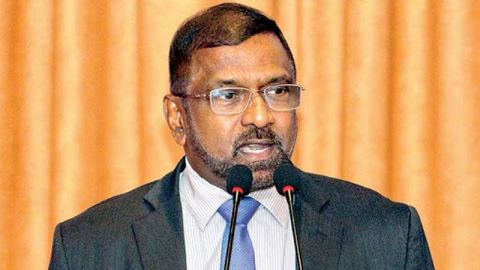
Sri Lanka’s foreign secretary has hit out at the United Nations Human Rights Council, the United States and the Tamil diaspora in an interview on Monday, claiming that organisations were “bullying” Sri Lanka and revealed that his regime is awaiting a draft of a consensual resolution from the Core Group in Geneva.
Speaking to the Daily Mirror, Sri Lanka’s foreign secretary Admiral Jayanath Colombage said the UN Human Rights Council was being “unfair and unjust.”
“Through the UN system, some powerful countries may try to coax smaller countries to toe their line using human rights as a tool,” he claimed. “When you look at the composition of it, it is global Political North dominated. We belong to the Political South. We have the north-south divide of the world. We fear whether they will hijack the agenda of the UNHRC to target Sri Lanka this time.”
He went on to state that his regime will canvass “like minded countries”. “We want to tell them our narrative,” he continued. “We want to tell you that today it is us and it will be them tomorrow. Therefore, we need to have a unified stand against this bullying tactic of supranational organizations.”
In particular, the foreign secretary took aim at the United States with his remarks.
“(The USA) left the UNHRC calling it a cesspool of political bias,” he said. “Yet, they influence through their proxies. I guess the US needs a lot of time to rebuild its image of America, to rebuild the democratic institutions, to bring back law and order and to battle Covid-19. I think they will be focusing on making corrections and things better for America.”
He further alluded to the US when making comments on the apparent peaceful nature of Sri Lanka, claiming that there had been “zero” deaths since May 2009, when Sri Lankan security forces slaughtered tens of thousands of Tamil civilians in a military offensive.
“If you take 2021, Sri Lanka is one of the most peaceful countries in the world,” Colombage claimed. “We know what is happening in the highly developed countries - vandalism, attacks against the institutions, seats of democracies and fellow citizens. In such a context, Sri Lanka is a very peaceful country.”
'We are awaiting the draft'
The foreign secretary, who himself stands accused of being complicit in torture, also revealed that the Core Group of countries - the UK, Canada, North Macedonia, Canada, Germany and Montenegro – have sought a consensual resolution on accountability, with the co-operation of the Sri Lankan government.
“We are awaiting the draft,” commented Colombage. “This is the only thing on the table at the moment. We agreed that the text of such a consensual resolution will be decided by both sides- the core group and Sri Lanka.”
His revelation comes after the prospect of a consensual resolution was slammed by several international human rights organisations this week, all of whom called for an international accountability process.
'They have lots of money'
Colombage went on however to reiterate claims that the Tamil diaspora was driving such moves for accountability. “They have lots of money because they were part of terrorist- financing, money-laundering and criminal syndicates,” he claimed, implying that politicians in Western capitals were being swayed purely by diaspora votes.
“In the democratic political system, votes matter - no matter what we say,” he continued. “A politician is not in power as long as he or she does not get enough number of votes. The vote is the most important thing.”
Going on to claim that the diaspora are “abusing liberties given to them”, he also slammed the projection of a karthigaipoo on to the British Houses of Parliament in November. “This is the campaign which the diaspora is carrying out,” he continued. “They are trying to influence the international bodies to target Sri Lanka… We have requested those governments to take note of it.”
“We have compiled a dossier containing details about the atrocities committed by the LTTE and given copies of it to the relevant countries,” Colombage continued. “We have given the copies to every country where celebrations were done by them. We shared it with the embassies here and with our embassies in their capitals. Some of the countries admitted that what the Diaspora activists did was illegal.”
'A matter of science'
The foreign secretary also criticised the Tamil diaspora for showing solidarity with Muslims on the island, who have been protesting against the forced cremation of suspected coronavirus victims.
“I see the LTTE Diaspora group trying to use this to see that there is discrimination in the country,” commented Colombage.
“It is an unfortunate thing as far as the Muslim burial issue is concerned,” he continued. “It is a matter based on scientific and health regulations. It is not a political issue. It is not an ethnic issue.”
“I don’t see any discrimination. It is a matter of science.”
See the full text of the interview here.
Just last week, Colombage said his regime was firm on withdrawing from a UN resolution on accountability, as he slammed the global body, claiming there was an “ulterior motive” behind calls for a justice mechanism and that thousands of forcibly disappeared Tamils are abroad “living somewhere”.
Read more here: Sri Lankan foreign secretary slams UN Human Rights Council and claims disappeared Tamils are 'abroad'

